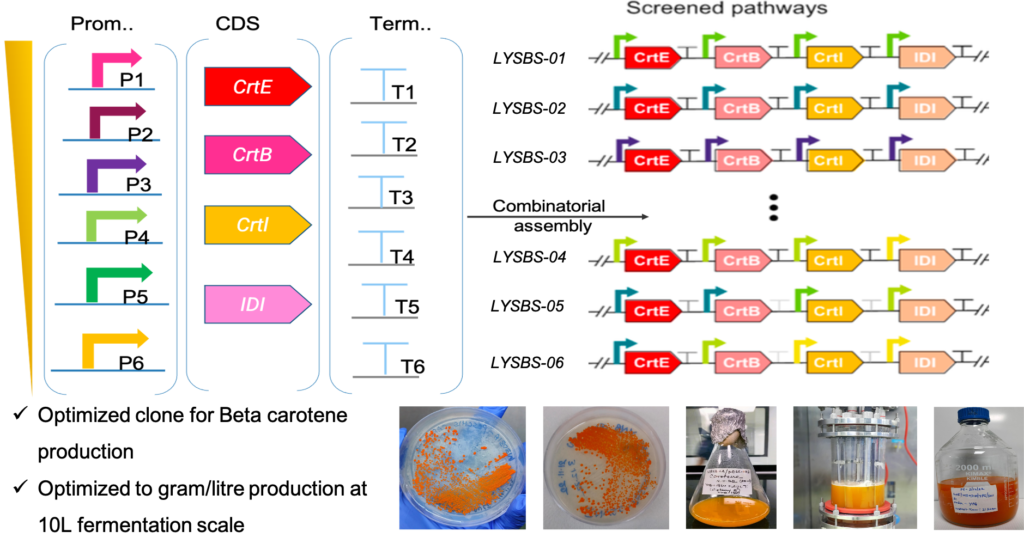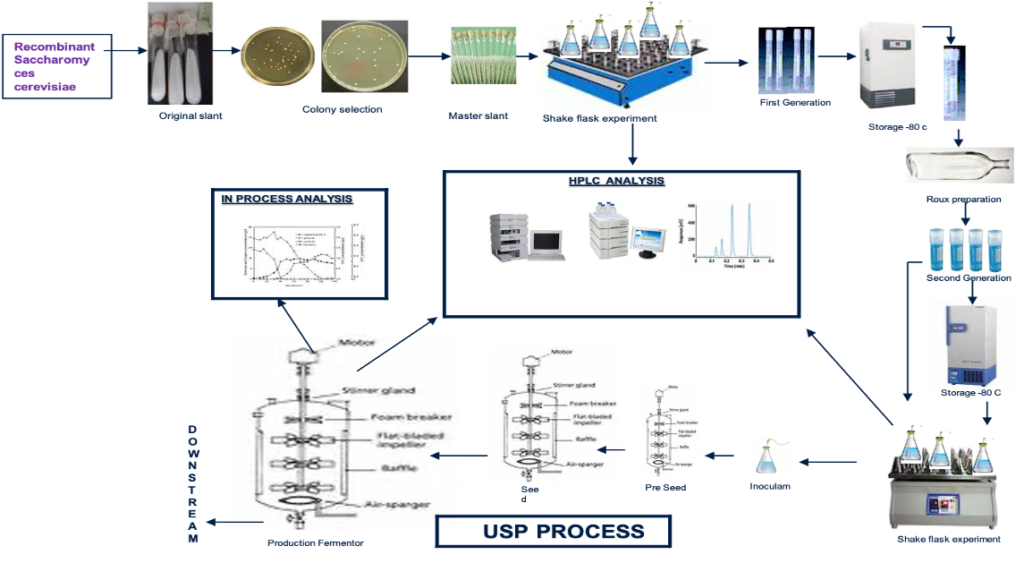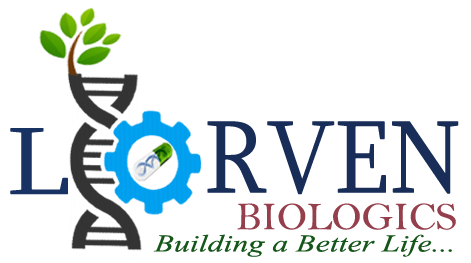
Synthetic Biology & Strain Engineering
In modern science, synthetic biology and biotechnology have great potential to shape the industrialization of biology that will drive the rapid development of novel microbial manufacturing platforms.
Our in-house developed, proprietary, and innovative bacterial and yeast expression platforms, in conjunction with synthetic biology tools, offer unique commercial potential in the development of high value complex bio-products through rational design of heterologous pathways into microbes
Our Synthetic biology and strain engineering platforms for development of high value natural products have great advantages over conventional production practices in-terms of,
Environment-friendly process (control in pollution by avoiding toxic solvents & chemicals in purification/extraction process, reduction in carbon foot print)
Significant increase in product yields
Product Purity
Reduction in turnaround time to reach the market
Remarkably reduced production cost
In this context, Lorven Biologics successfully developed handful technologies using in-house developed, innovative Synthetic Biology-based tools, thereby addressing the challenges for bulk production of biomolecules in microbial cell factories.
Beta-carotene

Carotenoids are a class of pigments of commercial interest that have important biological functions.
In humans, β-carotene is the precursor of vitamin A;
It functions also as an antioxidant, has properties protective against cancer, and stimulates the immune system.
Using Yeast metabolic engineering tools we developed stable Beta carotene producing Yeast strains.
Fermentation process was optimized to 100 L fermentation scale with gram/L yields.
We demonstrate the complete microbial production of B-carotene in Saccharomyces cerevisiae from glucose, an early step towards a sustainable fermentation process enabling rapid and on-demand production of tailor made B-carotene for multipurpose applications in food, cosmetic and pharmaceutical industries.
Stevia is nearly 200 times sweeter than sugar, according to studies.
Furthermore, it is a calorie-free sweetener with no adverse effects on the human.
As a result, people are shifting their preferences from artificial sweeteners toward natural sweeteners.
Stevia has the potential to become a billion dollar sweetener product in the $70+ billion global sweetener industry.
Fermentation will allow production of pure stevia sweeteners with superior taste, cost & supply chain attributes.
These advantages will enable fermentation-derived stevia to successfully displace the mass market, nutritive sweeteners - HFCS and sucrose.
Stevia sweeteners are approved by FDA and EFSA.

cerevisiae and probiotic microbes have GRAS (Generally recognized as safe) status for use in food industry in USA and EU. Steviol glycosides produced in microbes by fermentation have received GRAS status in USA, through evaluation.
We developed a novel recombinant yeast strain and implemented metabolic pathway engineering approaches for customized and enhanced production of Steviol glycosides.
Developed strains can able to produce target yeast glycosides at gram/L scale. The process is optimized to 100 L fermentation scale.
We are the first to offer controlled sweetener profile through customized integration of different Steviol glycosides and implementing sustainable fermentation process enabling rapid and on-demand production of tailor made Steviol glycosides.

Betalain
Betalains are a family of natural pigments (red and yellow) found in plants of order Caryophyllales and some higher order fungi.
Betalains constitute a group of compounds with great potential for the enrichment and supplementation of foods due to their pigmentation, antioxidant, antimicrobial properties, and other bioactivities associated with putative health benefits for humans
We developed a yeast-based platform for bulk production of betalains as a potential alternative to land- and resource-intensive agricultural production.
We are the first to demonstrate the complete microbial production of betalain in Saccharomyces cerevisiae from glucose as an early step towards a fermentation process enabling rapid and on-demand production of this natural pigment.

Violacein, an indole-derived, purple-colored natural pigment isolated from Chromobacterium has shown multiple biological activities.
We demonstrate the complete microbial production of violacein in Saccharomyces cerevisiae from glucose for rapid and on-demand production of violacein.

We developed a recombinant yeast strain, capable of producing violacein in gram scale at 10 L fermentation scale.
- Liraglutide is used as a long-acting glucagon-like peptide-1 receptor agonist to regulate insulin secretion.
- Until recently there is no report of recombinant DNA based technology for production of Liraglutide.
- Our technology on Liraglutide would benefit many pharma majors to decrease their cost of peptide production.

- Application ready Liraglutide Biosimilar from yeast.
- Highly pure (96%), available at an economical price.
- Lorven’s Liraglutide is expressed in our bioengineered yeast expression system.
- Direct secretion of active peptide into the growth media, shortening the manufacturing process.
- Endotoxin free secretion system.
- Yields up to gm/lit/hour.
- Reduced production cost and time to market.
- Biosimilar to Liraglutide (Novo Nordisk).
- 100% native confirmation.
- Functionally active peptide.
- Free from animal-derived components.
- Our engineered yeast-derived Liraglutide is at Preclinical stage.
- Saccharomyces cereviseae: Genetically highly amenable host organism with BSL-1 maintenance.
- International patent (WO2019082138A1) is held by Lorven Biologics Pvt. Ltd. for the bio-production of Liraglutide.
- Title: Process for preparation of Liraglutide using recombinant Saccharomyces cerevisiae
CRM197

BACKGROUND
- CRM197 is a detoxified Diphtheria toxin, which is a widely used carrier protein for protein-polysaccharide conjugate vaccines.
- CRM197 is used as the carrier protein for Menjugate, Menveo (Novartis), Prevnar, HibTITER (Wyeth), Synflorix (GlaxoSmithKline) and PCV15 (Merck), etc.
- CRM-197 is widely used as carrier protein in the conjugate vaccines against Streptococcus pneumoniae, Haemophilus influenzae b, Neisseria meningitides, etc. by the leading vaccine manufacturers.
SALIENT FEATURES OF CRM197 FROM LORVEN BIOLOGICS
- Conjugation ready recombinant carrier protein CRM-197
- 0% pure, available at an economical price.
- Lorven’s CRM197 is expressed in our proprietary bioengineered Bacillus subtilis expression system.
- Direct secretion of active CRM197 into the growth media.
- Endotoxin free secretion system.
- Fully functional native conformation.
- Yields up to gm/lit/hour.
- Reduced production cost and time to market.
PRODUCT QUALITY
- Biologically identical to native CRM197.
- 100% native conformation.
- High immunogenicity as a carrier with vaccine.
- Free from animal-derived components.
SAFETY
- Bacillus subtilis: Genetically highly amenable host organism with BSL-1 maintenance.
IP
- International patent (WO2019043593A1) is held by Lorven Biologics Pvt. Ltd.
- Title: Nucleic acid encoding CRM197 and process for improved expression thereof
Our pipeline projects
Anthocyanins (ACNs) are bioactive, water-soluble phenolic compounds, which represent one of the principal families of natural pigments.
Owing to their antioxidant nature and chemopreventive properties, anthocyanins are known to protect cardiac health and boost defences against cancer.

We are developing anthocyanin producing yeast strains using metabolic engineering tools for rapid and on-demand production of this natural pigment.
Daunomycin
Daunorubicin, also known as daunomycin, is a chemotherapy medication used to treat cancer. Specifically, it is used for acute myeloid leukemia, acute lymphoblastic leukemia, chronic myelogenous leukemia, and Kaposi's sarcoma.
We are developing daunomycin producing yeast strains using yeast metabolic engineering tools, followed by a structured fermentation process enabling rapid and on-demand production of Daunomycin.

Paclitaxel (PTX), sold under the brand name Taxol among others, is a broadly used chemotherapy medication to treat a number of types of cancer. It is considered to be one of the most successful natural anticancer drugs available.
You may add here a brief note on how it is currently produced, existing limitations (cost, yield) and what potential advantages could be offered through Lorven process. For e.g., relatively low concentration of paclitaxel present in the plant, and inherent limitations of using plane cell and fungal cultures to produce this compound on bulk scale-Lorven technology helps overcoming these hurdles.

Paclitaxel is a tetracyclic diterpenoid isolated originally from the bark of the Pacific yew tree, Taxus brevifolia.
We are developing Paclitaxel producing yeast strains using yeast metabolic engineering tools and a fermentation process enabling rapid and on-demand production of Paclitaxel.
It is a mitotic inhibitor used in cancer chemotherapy.
Reach us
Operations
D No 5-62/2, BNR Building, Dulapally Road, Medchal, Malkazgiri, Kompally, Hyderabad, Telangana-500014.
Registered
D No 80-1, Modugulapeta Village, Govindapuram Post, Santhakaviti Mandal, Srikakulam, Andhra Pradesh-532123.
Contact info
Contact Number
+91 7780 568 694
EMAIL ID
info@lorvenbiologics.com
